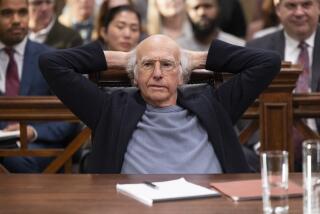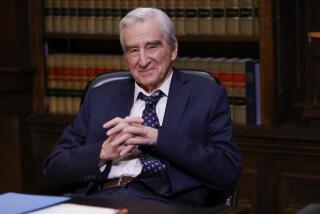‘Sons of Anarchy’ series finale review: I got this
Who was Jackson Teller?
For seven years, the biker prince of Kurt Sutter’s “Sons of Anarchy” has slipped into the body of a family man, a reformer and an outlaw, filling each role admirably for periods of time, but never seeming quite comfortable in any of those skins.
He tried to feed off the influences of his father, stepfather and mother, depending on his needs and the needs of those around him, but over the course of seven seasons, found each role model he tried to follow was deeply flawed in one way or another.
Halfway through the uncomfortable and inevitable final chapter of “Sons of Anarchy,” Jax tells Nero that he finally understands who he is. He seems to be at peace with his life and decisions as he barrels down a California highway in the series’ closing seconds.
But if he wound up on that roadway for any one reason, it was because he figured out who he was long past the point where it might have made a difference.
For seven seasons, “Sons of Anarchy” has been both an above-average testosterone drama, a possible heir apparent to FX’s greatest success story (“The Shield”), and a messy, raunchy romp that seemed to eschew narrative in place of gunplay. Compared to some of the slog that followed its first two seasons, the seventh and final set of “Sons of Anarchy” episodes were among the show’s better offerings, even if it never returned to the heights it once soared at.
I’m having a hard time simply labeling this finale as good or bad. But it was right. It was true to the series, and maybe there’s a parallel there between Jax and the series he lived at the center of.
“Poppa’s Goods” was an admirable and fitting close to the often turbulent drama, and it checked most of the boxes on the “Sons of Anarchy” drinking game I wish I had come up with sometime before right now. Charlie Hunnam was shirtless, there was a car chase, the episode ran well over its allotted time, there were no less than two musical montages and much of the episode felt like it was waiting around for a few scenes, even if those few scenes were played expertly by Charlie Hunnam.
I haven’t always loved Hunnam in this role. He often forgets to conceal his accent and sometimes he appears to be trying a little too hard to portray Jax as a charming antihero, but he’s always been game when the show called for heavier material. His reaction to Tara’s murder last year might have been his best scene in the series, but Jax’s last conversation with Nero and final goodbyes to Thomas, Abel and the club were right up there. In a finale that smartly closed ranks around its main character, Hunnam was more than up to the task.
As has become the norm with “Sons,” this episode ran on for what seemed like forever, and the scenes that didn’t involve Jax didn’t really do a ton for me, but the finale’s length actually worked in its favor for once. I’d imagine Jax’s suicide and the manner in which he chose to die didn’t come as a surprise to any longtime fans of the series, so the sense of inevitability gave an added weight to the proceedings. The story may have taken some pit stops to tie up the final gangland arcs, but really, this was Jax Teller’s eulogy, and that’s where the show needed to land.
I know I keep describing the series end as fitting more than anything else, but that’s really the only word that applies here. Jax has often been his own worst enemy, and I generally think he’s struggled more in battles with himself and his parents’ ideals than he ever did with any of the show’s myriad antagonists. It was wise of Sutter to eradicate nearly all of the show’s villains and wrap up Gemma’s story before “Poppa’s Goods,” because this episode needed to, and did, focus on Jax’s internal tug of war.
In the end, Jax paved the path toward the finish line by accepting some of the ideals he gleaned from Gemma, J.T. and even Clay. But he never became who any of them envisioned. He’d already tried those suits on and none of them fit.
He completes J.T.’s mission by severing the club’s ties to Irish gun-running, but he goes a step further than his father did in trying to protect his children from the life he lived, asking Nero to teach Abel and Thomas to hate him rather than leaving the boys a manuscript to understand and decipher like J.T. did for Jax. (Though, and credit to a good friend of mine and longtime “Sons” fan for pointing this out, the shot of Abel clutching Jax’s ring might signify that the boy might always want to be just like his outlaw dad).
To leave his club and Charming in a somewhat less bloody position than they often were throughout the series run, he takes up Clay’s talent for carnage, dropping bodies left and right to bring about a gangland peace. But unlike Clay, he raises up his guns knowing each bullet is a step closer to jail or his planned suicide, making a sacrifice his stepfather never would have. Gemma’s influence is present too, as Jax is making catch-all decisions for his family and the club, though he’s at least involving some of the people those decisions will affect in the process, refusing to follow his mother’s “her way or the highway” approach.
In the end, Jax was the sum of his parents’ parts, and those parts couldn’t live in the same body. He was capable of monstrous actions and heroism, and his death exemplified both halves. “Sons of Anarchy” was at turns a great series and a terrible one, depending on when you checked in.
In the end, they both landed somewhere in the middle, and maybe, that was where they always belonged.
Follow @JamesQueallyLAT for breaking news in the real world, and come January, the latest news out of Harlan County during the final season of “Justified.”
More to Read
The complete guide to home viewing
Get Screen Gab for everything about the TV shows and streaming movies everyone’s talking about.
You may occasionally receive promotional content from the Los Angeles Times.







